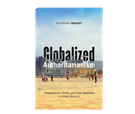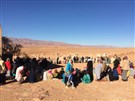I remember a journalist asking a few weeks ago: has the world become a better place because of the Arab spring? I think what he meant was: are we living today in a better world because the Arab peoples have gotten rid of, or are getting rid of, some of the worst authoritarian leaders in the world? The question implicitly referred to the matter of democratization. Of course, the issue of democratization has dominated the study of political change in the Arab world over the last twenty years. However, a better question to ask would be: can the world become a better place because of the Arab uprisings? There is a slight nuance between these questions. The first question refers to something that has already happened—the ousting of so-called bad dictators—while the second question opens space to look at the potential of the social protests in the Arab World in their fight against something bigger, a fight against a kind universal political project: that of neoliberal globalization. And if we look at it from that perspective, the social struggles of Egyptians, Tunisians, and other peoples in the region entail a much wider political dimension. Moreover, if we truly consider the socio-economic background of the Arab uprisings—that is, the increasing uneven development, rising unemployment, and the increasing concentration of wealth in the hands of a few leaders and their entourage—then we actually see many parallels with the social struggles and political concerns of other current protest movements in the world, such as the indignados in Europe, Occupy Wall Street in the US, and the Chilean student protests.
These parallels between social protest in the Arab region and the rest of the world can be considered both within a historical framework and by looking at the connections initiated by the protesters themselves. First, let me briefly elaborate on the historical framework. To understand the significance and implication of the Arab uprisings, we must not forget that the current pressures for change are rooted in the political changes of the last thirty years. More precisely, the socio-economic reforms of the last three decades were evidence of a fundamental political transformation that can be related to the politics of neoliberal globalization. Put simply, what we generally understand as neoliberalism is not just some utopian free-market model that got a little bit out of hand, a model—as a consequence of this narrow understanding—that can be remedied by appointing “politically neutral technocrats” in Europe (for example, in Italy) or transparent and democratically elected rulers in the Arab world committed to the so-called universal principles of good governance. One should pay attention to the fact that while many European leaders see liberal democracy as the solution for the Arab region, in their own continent they are getting past the conviction that it is up to nationally and democratically elected leaders to resolve the current crisis of capitalism. Instead they now look to technocrats, the IMF, and the European Union for salvation.
In contrast to the imagination of neoliberalism as an excessive free-market model, we should understand neoliberal transformations in the Arab region for what they really are: a political project—or better yet, a range of political projects, because there is no one-size-fits all model. But despite the crucial differences within and between different states in the region, there are some general tendencies that are necessary to take into account in order to consider the global dimensions of the current uprisings in the region. First of all, neoliberal politics in the Arab region meant an attack on the achievements of the developmental state that experienced its heyday in the 1950s and the 1960s. The project of former Egyptian president Gamal Abdel-Nasser was probably the classic example of the Arab developmental state. Through radical land reform, public sector investment, increasing subsidies on all kinds of primary consumption goods, and prestige projects such as the Aswan Dam and the nationalization of the Suez Canal, Nasser succeeded in raising the living standards of millions of ordinary Egyptians. Here we can draw a first parallel with what happened in Europe and the United States, where the achievements of the welfare state were and are increasingly under pressure. While Keynesianism/welfarism in the West and state developmentalism in the Global South supported the premise that general welfare and a minimum guarantee of social security would benefit capitalist development, neoliberal theory promised that the prioritization of capital accumulation and profit maximization would (through the notorious trickle-down effect) eventually produce generalized welfare. This has proven to be a myth, and social inequality has been on the rise consistently over the past thirty years in Europe, the United States, and the Arab region.
Secondly, and related to this last point, the systematic rollback of the developmental state through structural adjustments, austerity measures, and privatization meant that the middle and labor classes in the Arab region came increasingly under pressure, mainly due to the cutback of income redistribution mechanisms and rising job insecurity. For example, before the 1980s and the 1990s, university graduates were practically guaranteed a job in the public sector in countries such as Morocco, Egypt, and Tunisia. These neoliberal reforms were at the basis of the motivations of ordinary people to come out into the streets en masse in 2011 and overthrow authoritarian leaders. Again, there are parallels that can be drawn with social protest movements like the indignados and the occupy-movements. Also within these movements, the middle classes and middle class youth are the ones that came out onto the streets to denounce social injustice and inequality caused by years of neoliberal policies. The important lesson we have to remember here is that it is not so much poverty that draws these protesters into the streets of Cairo, Tunis, New York, and Madrid, but increasing and continuously growing social inequality.
Third, many who have studied the Arab world know that the protests of 2011 are not new. They are the culmination of years of socio-economic unrest, often in smaller villages and towns. Well-known examples are the strikes in Mahalla in Egypt, the struggles of the miners in Gafsa in Tunisia, and the campaigns by unemployed graduates and the movement against the rising cost of living in Morocco (“le movement contre la cherté de la vie”). Anti-neoliberal protests in the West are also not new, having emerged twelve years ago with the anti-globalization movement.
Besides the historical framework, there are other phenomena that prove that the explanations for the Arab uprisings cannot be located exclusively within endogenous political trajectories of regime change and authoritarian persistence. Protesters within the indignados movement or within Occupy Wall Street have repeatedly emphasized and expressed that they were directly inspired by the occupation of Tahrir Square and the Arab uprisings more generally. People all over the world began to mobilize and organize in similar ways. They used similar tactics and strategies, such as the occupation of squares and other public spaces, and the setting up of horizontal structures of organization like general assemblies. Through mutual forms of solidarity and debates, the protesters themselves pointed out the global dimensions of the Arab uprisings that were often ignored by the mainstream media.
An interesting example was the debate that emerged on Jadaliyya between OWS and Egyptian activists regarding how to give form to solidarity. In fact, this debate has shown that the seemingly simple question of how to express one’s solidarity with someone else living in a different context is not free of pitfalls and power relations. The Egyptian Comrades of Cairo reacted with surprise to the proposition of OWS to send twenty observers to the elections of last November. The Comrades of Cairo answered with the following revealing statement:
Regardless of how one stands on the efficacy of elections or elected representatives, the Occupy movement seems outside the scope of this; your choice to occupy is, if nothing else, bigger than any election. Why then, should our elections be any cause for celebration, when even in the best of all possible worlds they will be just another supposedly “representative” body ruling in the interest of the 1% over the remaining 99% of us?
As such, they continued:
Our struggle—which we think we share with you—is greater and grander than a neatly functioning parliamentary democracy; we demanded the fall of the regime, we demanded dignity, freedom and social justice, and we are still fighting for these goals. We do not see elections of a puppet parliament as the means to achieve them.
In contrast to these kinds of messages and insightful debates, mainstream media and politicians have tried to criticize OWS and the indignados for not knowing what they really want and for not offering any concrete alternatives. This imagination of the social protests in Europe and the US proves, I think, that they (the mainstream media and the politicians) do not fully understand the dynamics of what is going on and what it might become.
The mere rejection of the current status quo by the occupiers embeds an essential and critical vision of the politics of the future (or the politics from below). The key lies within its main goal: occupation. First of all, through their actions and their forms of organization, demonstrators all over the world have created the space for a radical alternative to neoliberal hegemony, without falling into the trap of delivering one directly. Secondly, through the process of organizing their protests, they are directly giving form to possible new alternatives, alternatives that are not drafted with specific lists of concrete points that can be handed over to the authorities, but to the contrary, that are constructed on site.
In a recent publication by YES! Magazine on OWS, this point was formulated as follows:
Through the Occupy Wall Street movement we’re redefining power, learning new ways to make change, and winning back our political self-respect. Instead of petitioning the powerful for change, we’re making it happen ourselves. Instead of taking direction from leaders, each of us can claim the right as a sovereign individual to be part of powerful collective action. (69)
To give an obvious example, the very act of occupying and the vision behind the organization of an encampment are evidence of a concrete anti-hegemonic project. After several decades of neoliberal urbanism in which the city has been redesigned and restructured to satisfy the desires and interests of global capital over and above those of its actual inhabitants, the occupation of public space—or in some cases “privately owned public space” like Zucotti Park—turns the urban space back into a battlefield where the increasing privatization of public space and the organization of social life according to market-oriented principles are contested and replaced by concrete socio-political alternatives. Social life within these encampments reflects a radically different way of life based primarily on solidarity, social equality, and radical democracy. Through these kinds of actions, protesters claim their “right of the city.” As such, these protesters are not just “against the system”; they are actively giving form to possible alternatives.
The global dimension of the Arab Spring has nothing to do with some kind of "Arab awakening." The Arab people weren’t asleep at all during the past decade, as Rabab el-Mahdi has pointed out on the program "Empire" on Al-Jazeera. In fact, we should see it the other way around. Arab protesters have awakened OWS and the indignados. They restarted what the anti-globalization movement couldn’t carry through. As such, what started in Tunisia has now created space on a global scale to question and contest neoliberal hegemony. Until now, this is its most important accomplishment. Hopefully, many others will follow.
![[Image from OWS action in New York. Photo by Koenraad Bogaert.]](https://kms.jadaliyya.com/Images/357x383xo/DSC06744.jpg)










